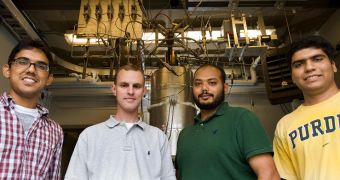A team of scientists from the Purdue University has recently put together a new facility for the study of synthetic fuel, whose aim is to make it easier for experts to learn how fossil fuels such as coal and biomass are broken down.
These substances are usually placed inside machines called gasifiers, which break them apart into their individual components. Advancements in understanding how this happens may be used to set the foundations for synthetic fuel economy.
“A major focus is to be able to produce a significant quantity of synthetic fuel for the US air transportation system and to reduce our dependence on petroleum oil for transportation,” explains scientist Jay Gore.
The expert is the Reilly university chair professor of combustion engineering at the Purdue University.
The ultimate goal of investigations such as this one is developing methods of producing large amounts of synthetic fuel from byproducts such as biomass and agricultural wastes.
Even coal can be turned into gas using Steam, and then converted back into a liquid fuel, which potentially far-reaching applications for the transport and automotive industry.
But the new technology would also have to produce less pollutants and greenhouse gases than conventional synthetic-fuel processing methods. The production of excessive amounts of carbon dioxide is a major issue for this line of study.
Reducing CO2 output is possible, experts say, as is increasing the liquid fuel yield. An added bonus is that both conditions can be achieved at the same time, by adding hydrogen into the coal-and-biomass-processing reactor.
This approach was developed in the lab of Purdue Winthrop E. Stone distinguished professor of chemical engineering, Rakesh Agrawal.
“We want to show that our system is flexible for using coal and biomass. The aim is to create a sustainable synthetic fuel economy,” Gore explains.
“What's daunting is the size of the problem – how much oil we need – how much energy we need. At the right price, synthetic fuels could replace fossil fuels in all conceivable applications,” he goes on to say.
Funding for the new work comes from the US Air Force Office of Scientific Research, the Purdue team reveals.

 14 DAY TRIAL //
14 DAY TRIAL //